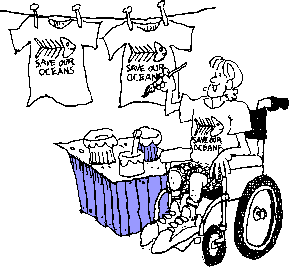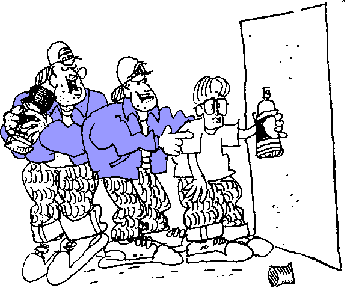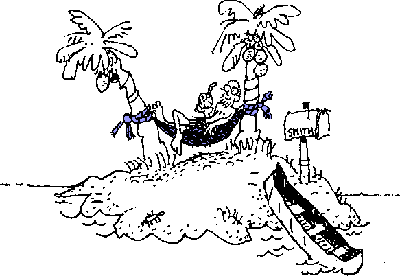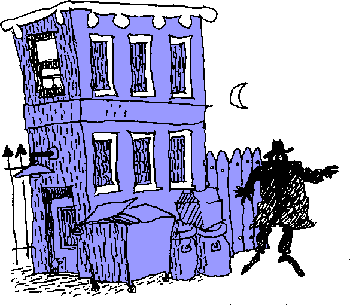This lesson is taken from the Privacy section of Foundations of Democracy: Authority, Privacy, Responsibility, and Justice.
Following is the "Purpose" statement of the unit from which this lesson is taken:
Every time we maintain privacy there are certain consequences. Some consequences are benefits, or advantages; some are costs, or disadvantages. Knowing the consequences of privacy can help us make decisions about issues of privacy. For example, if you are trying to decide in a particular situation whether a claim to privacy should be recognized, you need to think about what the benefits and costs might be of maintaining privacy in the situation. In this unit, you will learn to identify some common benefits and costs of privacy. You also will learn that different individuals may have different opinions about whether the right to privacy should be protected in a particular situation.
Purpose of Lesson
This lesson examines some of the possible consequences of privacy. You will classify these consequences as benefits or costs. Later, you will be asked to evaluate positions on issues of privacy by thinking about the consequences of privacy. When you have completed this lesson you should be able to explain some common benefits and costs of privacy.
Terms to Know
- benefits
- Writs of Assistance
- costs
|
|
- creativity
- intellectual stimulation
|
Critical Thinking Exercise
Identifying Consequences of Privacy
Your class should be divided into small groups. Each group should read the situations below and list the possible consequences of privacy in each situation. Next, the group should classify these consequences as benefits (advantages) or as costs (disadvantages). Each group then should share its lists of benefits and costs with the class.
- Before the American Revolution, English officials in the colonies were able to use general search warrants, called Writs of Assistance, to enter the colonists' homes at any time and search them for evidence of crimes. Now, our privacy is protected by the Fourth Amendment to the U.S. Constitution. Because of the Fourth Amendment, government officials cannot use general search warrants to search for evidence of crimes. Instead, they can only get a warrant if they first convince a judge that there is good reason to believe specific evidence of a crime will be found in a particular place. Then, if he or she is convinced, the judge issues a specific search warrant "particularly describing the place to be searched, and the persons or things to be seized."
- Schools keep records on every student. Teachers and counselors write comments about each student in these records. These records are often kept in the principal's or counselor's office. Only teachers, counselors, administrators, or a student's parents may see these records.
- According to the laws in most states, a lawyer may not, under most circumstances, reveal what a client has said to him or her in private.
- When Carol's grandfather died, she cried and cried at home. But Carol never let her feelings show at school. When Carol's friends asked her what was bothering her, she just shook her head and didn't say a thing.
Examining Consequences of Privacy
As you can see, privacy may have many different consequences, some of which are benefits and some of which are costs. Some of the most common benefits and costs of privacy are described in the next two sections. As you read these sections of the lesson, think about the benefits and costs that result from privacy in your own life.
Benefits of Privacy
Freedom. Privacy may enable people to be free to think and act as they please without unreasonable and unfair influence or control by others. This freedom may prevent a society from becoming totalitarian, that is, subject to complete control by a dictator or ruling party. For example:
- In the privacy of their homes, people may feel free to speak with their family and friends about ideas and beliefs that may not be popular with others. Talking with family and friends may lead to new ideas and thoughts.
Security. If people respect each other's privacy, they can feel secure in their persons, homes, beliefs, and relationships. For example:
- If your friends respect your privacy, you can feel secure that they will not bother you when you want to be alone, or embarrass you by repeating your personal thoughts and opinions to others.

Protection of economic interests.Privacy may enable people to keep to themselves such things as ideas, plans, inventions, and ways of accomplishing goals or making products. This may help them in creating and selling new products and competing with others. For example:
- Suppose you designed a T-shirt that you thought would sell well and make a lot of money for you. Keeping your idea secret until you had created the T-shirts and had them ready for sale would protect your idea from being taken by others.

Individuality. Without privacy, the pressure to be like others might stop an individual from forming his own values, beliefs and opinions. For example:
- Living in a large family or group with no privacy might make someone feel he or she has to go along with whatever the group or its leaders consider correct beliefs and behavior.
Creativity. Privacy may be necessary for creative thought or work. For example:
- Suppose you were writing a story, and someone was looking over your shoulder at everything you wrote. You might feel as though you were being judged, or worry about what the person would think of your story. Or suppose people were talking near you or asking you questions. You might find it difficult to concentrate.
Intimacy. Privacy is essential for the development of warm and affectionate relationships with other people. For example:
- People are not likely to develop close friendships and share their innermost thoughts and feelings with others unless they can do so in private.
Critical Thinking Exercise
Examining Benefits of Privacy
Work with at least one other person to write answers to the following questions. Include examples of real or imaginary situations to explain or illustrate your ideas.
- Do you think privacy is really necessary for people to develop close friendships? Why or why not?
- What pressures to be like other people are found in your school and community? In what way does having privacy free you from those pressures and enable you to develop your own thoughts, feelings, and lifestyle?
- How would you feel if you did not have a right to privacy in your personal possessions, or if people did not respect your wishes when you wanted to be alone?
- How does privacy help you to be creative?
Costs of Privacy
Loneliness and alienation.Too much privacy can result in people being cut off from others. It can lead to loneliness and to poor relations with others. For example:
- Suppose a person lived alone and rarely interacted with others. Being alone almost all the time might make the person feel uncomfortable dealing with people.
 Loss of stimulation and intellectual growth. People correct errors in their thinking and learn new ideas and ways of doing things by interacting with other people. Too much privacy can result in failure to exchange ideas and to learn from others. For example: Loss of stimulation and intellectual growth. People correct errors in their thinking and learn new ideas and ways of doing things by interacting with other people. Too much privacy can result in failure to exchange ideas and to learn from others. For example:
- Suppose a person never discussed his or her thoughts with others. It would be difficult for the person to become aware of errors in his or her thinking. It also would be difficult for the person to learn new ideas, and other people would never benefit from the person's ideas and information.
 Misbehavior and lawlessness. Privacy may prevent unlawful behavior from being discovered and punished. For example: Misbehavior and lawlessness. Privacy may prevent unlawful behavior from being discovered and punished. For example:
- If there are private places where people are not watched, they can go there to commit crimes or to hide evidence of their crimes.
Financial costs. Maintaining privacy may increase the cost of doing things. For example:
- Building homes with separate rooms to provide privacy costs more than building a single large room.
Lack of accountability. Privacy enables people to do things that cannot be observed by others. As a result, there may be no way to hold them responsible for wrongdoing. For example:
- If they are not being supervised, people might take shortcuts in doing their work, or cheat on a test, or steal. Other people might never discover what has been done, or there may be no way to prove who is responsible.
Critical Thinking Exercise
Examining Costs of Privacy
Work with at least one other person to write answers to the following questions. Include examples of real or imaginary situations to explain or illustrate your ideas.
- Can too much privacy make it difficult to be creative? Explain your answer.
- How might privacy lead to difficulties in developing friendships and in relating to other people?
- In what ways does privacy increase the cost of doing things?
- Do you think privacy makes it possible for people to commit crimes and not get caught? Why or why not?
- Do you think privacy makes it more difficult to hold people responsible for their actions? Why or why not?
Using the Lesson
- Identify an issue of privacy in the news media, or make up your own example. Prepare a chart which lists the consequences of maintaining privacy in the situation, and identify these consequences as benefits or costs. Be prepared to explain the issue to your class.
- Working with your teacher, invite a law-enforcement officer or an attorney to class to discuss their ideas about the benefits and costs of privacy. Prepare a list of questions to ask.
All rights reserved. Permission is granted to freely use this information for nonprofit educational purposes only. Copyright must be acknowledged on all copies. These materials were originally developed with the support of a grant from the National Endowment for the Humanities and have been prepared under Grant #85-JS-CX-0009 from the Office of Juvenile Justice and Delinquency Prevention, Office of Justice Programs, US Department of Justice. Points of view or opinions in this document are those of the authors and do not necessarily represent the official position or policies of the US Department of Justice.
ISBN 0-89818-151-8 |
 This site is brought to you by the Center for Civic Education. The Center's mission is to promote an enlightened and responsible citizenry committed to democratic principles and actively engaged in the practice of democracy. The Center has reached more than 30 million students and their teachers since 1965. Learn more.
This site is brought to you by the Center for Civic Education. The Center's mission is to promote an enlightened and responsible citizenry committed to democratic principles and actively engaged in the practice of democracy. The Center has reached more than 30 million students and their teachers since 1965. Learn more.



 Misbehavior and lawlessness.
Misbehavior and lawlessness.


